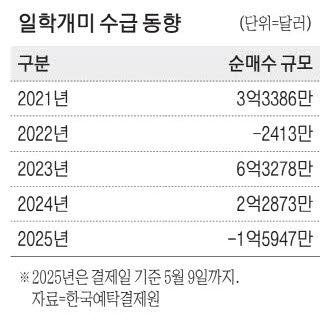 사진 확대
사진 확대
Ilhak Gami disposed of a large number of Japanese stocks that were shaken by the “Donald Trump risk” in the wake of the yen’s rebound.
Although the Nikkei 225 index, which had been over 40,000 units, has fallen to the threshold of 30,000 units this year, it is withdrawing funds as the yen price has been strong, reaching the 1,000 won level per 100 yen.
According to the Korea Securities Depository on the 11th, domestic investors net sold $159.47 million (about 220 billion won) worth of stocks on the Japanese stock market until the 9th of this year as of the settlement date.
Domestic investors, who net purchased Japanese stocks worth $228.73 million (about 320 billion won) last year and $632.78 million (about 880 billion won) in 2023, have switched to “sell” from this year.
This year, Ilhak Gami intensively sold U.S. government bond products, which were the top stocks. As the U.S. government bond market faltered, the yield of the U.S. Treasury Exchange Fund (ETF) listed in Japan was not noticeable, but it seems to be selling on the back of the strong yen.
Hundreds of billions of won in domestic funds have been withdrawn from the Japanese stock market, but the amount of Japanese stock holdings has increased by nearly $300 million. This is because content stocks, which have been sold by Ilhak Gami, are considered “tariff-free zones” and their stock prices have risen sharply.
Konami Group, whose stock price rose 40% this year, saw its domestic investor holdings rise more than 50% from $334.27 million at the end of last year to $52.25 million as of the 8th.
Bandai Namco’s stock price also rose nearly 30 percent, expanding its domestic investor holdings from $242.74 million to $323.62 million. Kadokawa’s holdings also increased by more than $70 million.
The stock market expects the Japanese stock market to gain momentum again from the second half of this year. Moon Nam-joong, a researcher at Daishin Securities, said, “The burden of the strong yen will continue, but there is a possibility that the link between the currency flow and the stock market will decrease from the second half of the year.”
[Reporter Kim Jeongseok]

AloJapan.com